
Success Stories
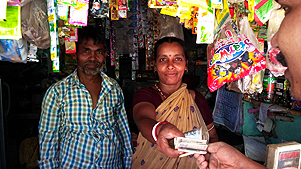
Empowering Radha Rani Haldar
She is a very simple and unassuming woman married to a poor family after she completed class IX as her father was not able to bear the cost of her education. Her husband Jaladhar Halder a day laborer worked very hard to make both ends meet . Once, Jaladhar fell ill and Radharani had to take personal loan from a neighbor at interest rate 5% per month. At this point of time she was brought to the DOPATI SHG of DCBS. She found the heaven in her hand to here that she can get a loan of Rs 5000/ without any security at a much lower rate of interest. She discussed the matter with her husband and decided to set up a grocery shop in the veranda of her thatched house. Within 7 days of her membership she received the loan and her First action was to repay the high interest loan of Rs2000/. She spent Rs500/ for treatment of her ailing husband and with the balance Rs2500/she started the grocery shop. Due to her good nature the ‘ Mahajan’(whole seller) supplied her commodities at 50% credit. The neighbours also extended support by purchasing goods from her shop as far possible. She laboured hard to manage the grocery shop along with carrying out of the family chores.
Her sincerity, honesty, perseverance and business acumen soon drove her business on a higher scale. She started supplying grocery goods for different occasions to the SHG members’ families and others.
She also contacted the whole sellers in Kolkata to purchase the goods at cheaper rate to increase her Profitability. In all her overtures to make growths DCBS was her financial partner. She was very particular in attending weekly meetings and paid the instalments without any default. Gradually the loan amount increased Rs. 10,000/- to 20,000/- & at present she is at the highest level of SME loan issued by DCBS at Rs. 30,000/-.
She is a grand success not only in developing her business but also in bringing about face-lifting in the life style of her family. She converted her thatched house into a small ‘Pakka’ building with arrangement of sanitary latrine and Tube-well for water supply. She put her kids in good schools and took care of their education.
She is an example to our SHG members and a strong devotee of DCBS. She consider DCBS a rescuer in her distress a constant companion in her process of growth & development , a friend philosopher and guide.
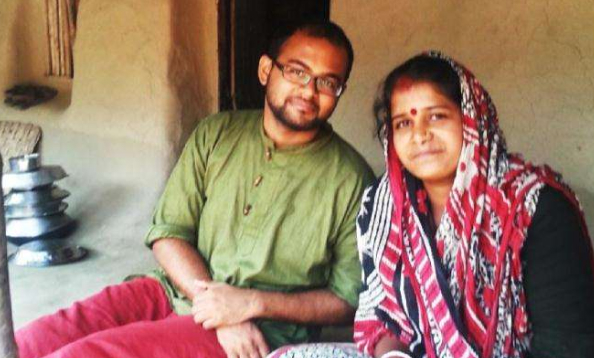
Story of Bimala Makhal
- Age: 45 years
- Village Name: Devisabad, Canning, South 24 Pgs
The following post was written by our one of our fundraiser champion, Adhiraj Saxena who raised Rs. 57,000 during our Diwali campaign. To see the impact, Adhiraj decided to fly down from Singapore to meet the borrowers in Dakshin Barasat, West Bengal and learn about measuring social impact from our field partner, DCBS.
This is my first article in the series I like to call ‘Measuring Social Impact’. It’s a lot to do with Simplicity. In my observation, we need to do a better job of Measuring Success in the sector of social impact. Who are ‘we’? –- ‘We’ includes a social entrepreneur business person who may be measured on how quickly he/she can raise capital instead of how efficiently she uses limited capital.- ‘We’ includes a community service centre that flashes on the front page of its website how it raised X thousand dollars in its fundraising drive, instead of describing how its work reduces the burden on social security financed by tax payers.‘We’ also includes you, who looks up to the CEO of a nutrition-deprived soda drink company flying in a private jet, but judges the morality of a social impact organization executive driving a swanky sedan.I have no interest to write about why the measurement of social impact and efficiency is currently problematic. I rather use our short attention span to (attempt to) write about HOW to logically measure it and define success. That’s my motivation and the challenge I’ve given myself to keep the discourse and its outcome simple. Not simplistic, but simple.My first lesson in measuring social impact was in Dhosa village, which is about a four hour taxi ride to south of Kolkata city (it’s the 3rd largest city in India in terms of GDP). The trip was hosted by DCBS (Dhosa Chandaneswar Bratyajana Samity), which is in the business of providing loans to the village women of Dhosa. It operates less like a commercial bank by putting more than 50% of its staff as ‘foot-soldiers’ to monitor the progress of their borrowers. And DCBS, is one of Milaap’s partner organizations.I’ll spend less time talking about Milaap – they are credible and popular enough to capture your interest without my help. DCBS is the focus of this piece and I have learnt some lessons on measurement and application of social impact business from them.Before I jump into the technicalities of measuring social impact, let me tell you why I am specifically interested to learn about this particular field partner’s impact only. Last October during Diwali, 18 of us (mostly from Singapore) raised loans worth about Rs. 57,000 to Dhosa village women who wanted to purchase solar-powered lamps for their families. You can see my campaign page here. That amount benefited about 30 families for a solar lamp with a lifespan of 5 years. You can see my campaign page here. That same amount is what 1 fresh IT graduate could get after working for 2 months in a big city like Bangalore. Since I was the one who lobbied these 18 folks to lend money for this specific cause, my credibility was on the line. I figured, the only way I could demonstrate the worth (or waste) of our loans to these village women, who had no established measure of their credit-worthiness, was to go down there and report what I saw for real.
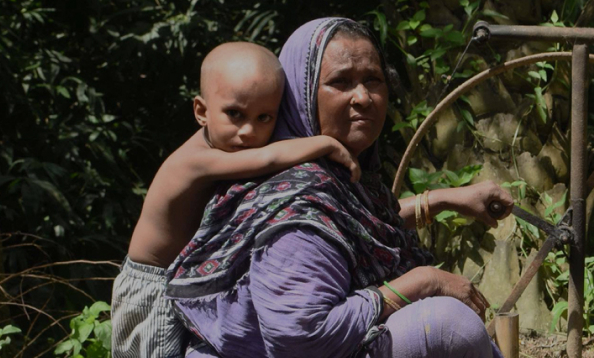
The Story of Tajmira Mondal
- Age: 35 years
- Village Name: Basdinghpur, South 24 pgns , West Bengal, India
Tajmira Mondal today is a suceesful businesswoman. She and her mother in law runs a jute thetread making unit which has made her financially independent. She supports her family, her children’s education and is now contributes capital towards her husbands bag making business.
A large part of her success could be attributed to the fiancial support she had recieved from DCBS over the last 4 years.
This is far cry from her condition 9 years ago, when her family was struggling economically to meet their ends. Her husband used to be the sole earner and his meagre income as a contractor in a bag compnay was hardly enough.
With no possibility f getting an investment or loan from banks she had applied for a loan from DCBS of Rs. 20,000 for starting jute thread making unit. Through hard work , she was able to grow the business in 4 years. We are happy that she has raised Rs. 35,000 in the fourth cycle of loan from DCBS and is now looking at growing her production.
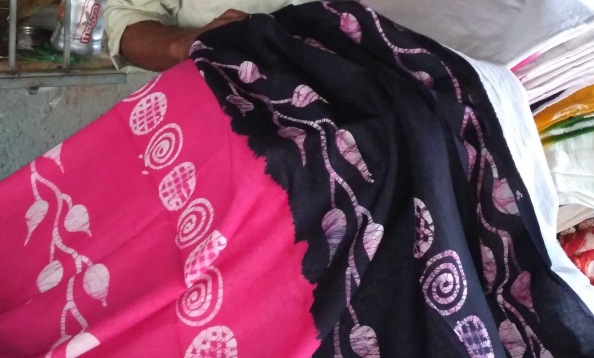
The Story of Debola Naskar
- Age: 45 years
- Village Name: South 24 Pgs, West Bengal, India
Debola Naskar wife of Gopal Naskar resides in the village Uttar Radha Nagar and is a very important borrower of our Dhamua Branch. She is also famous in the area for her “DEBOLA” Brand of Saree in the area. Things were very difficult before Five years when she and her husband, Gopal Struggled very hard to run the Family. Debola had the opportunity to undergo a Training program me conducted by the District industries centre of south 24 parganas district in hand printing of Sarees . After the training was over she was looking for Finance to start a unit for Sarees printing. She came down to our Dhamua Branch and was included in the “Dopati “ SHG. With in a week she was provided a loan of Rs. 10,000/- as her minimum need was assessed at that amount. She was highly pleased and ordered for the blocks and also purchases the Colours and other materials. She went to Bura Bazar in Kolkata for purchasing the’ Thans ‘ Clothes to be printed as Sarees. Within a few days she started her printing unit in the Baranda of her thatched house. She invest one helper women from a poor family in the village. At first she printed some samples and visited the cloth houses in Radhanagar, Dhamua, Magrahat and Diamond Harbour to collect orders. She primarily, she did not get much response. She was not frustrated she printed few dozens of Sarees and hawked in the ‘hats’, small market and near the bus stop. People started liking her printed Sarees and she also now got orders from the cloth shops. Considering her progress in business DCBS Dhamua branch doubled her limit to Rs. 20,000/- with in two years. She was also getting credits from the Market and develop her Business in a big way. Presently she has five women helpers and one qualified women for keeping the accounts of her business. She has made a History as an established women entrepreneur in the line of Saree printing in a remote village of South 24 Parganas district. Her Sarees are being sold not only in the south 24 Parganas district but also in Kolkata and other district of west Bengal. She has constructed a Small ‘Pakka ‘ building for housing her Saree printing unit and also for there living . She has now a Tube well and sanitary latrine in her house. This indicates an improvement in her life style. This is a case where a poor women by dint of her proper planning and perseverance was able not only to support her self but also to create employment to six other women in the rural Area.Here DCBS has played a very significant roll in providing financial assistance in her crucial time and also by giving proper guidance and advice throughout her journey for development.
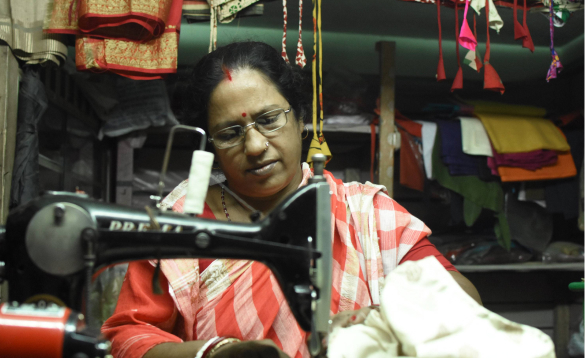
The Story of Debi Rani Halder
- Age: 45 years
- Village Name: South 24 Pgs, West Bengal, India
Debi Rani Halder is a student of the Ready Made Garmment Training Program. She is 45 years old and lives in the village of Dhosa in South 24 pgns (West Bengal). She is married and is the mther of 2 children.
Debi Rani started a tailoring shop on the ground floor of her house after completon of the 1 year course at the Ready Made Garment Training center run by DCBS in 2014. She took out a small loan from DCBS to start her enterprise.
We are delighted to say that now she is now complelty independednt and is able to fully support her children’s education and other fmily cost. In fact she has recently been able to contribute money as capital towards he husband’s business.
She is now looking to further grow her shop and employ more girls as assistants in order to acter to the growing demand.
Our Partners










 Donate now
Donate now